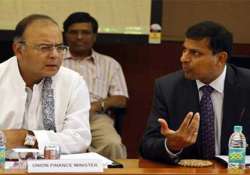Centre meets to discuss inflation, asks states to crack down on hoarders
New Delhi: With prices of essential food items shooting up, the Centre on Tuesday unveiled measures to tame inflation by asking state governments to crack down on hoarders and delist items such as onions and

New Delhi: With prices of essential food items shooting up, the Centre on Tuesday unveiled measures to tame inflation by asking state governments to crack down on hoarders and delist items such as onions and potato on which a minimum export price was slapped to discourage exports.
The steps were disclosed by Finance Minister Arun Jaitley after a high-level meeting in which Agriculture Minister Radha Mohan Singh, Food Minister Ramvilas Paswan, Commerce Minister Nirmala Sitharaman and top officials including Nripendra Misra, Principal Secretary to Prime Minister Narendra Modi, were present.
Maintaining that only four or five commodities have witnessed a spike in prices, the Finance Minister said states have been asked to crack down on hoarders who are trying to exploit apprehensions of a weak monsoon.
He said the states have been asked to delist certain items, which are usually procured through Agriculture Produce Marketing Committees, so that they come into the open market. About 50 lakh tonnes of rice will be released in the open market through state governments to cool prices.
While a USD 300 per tonne minimum export price on onion has already been imposed, a similar levy on potatoes will be decided by the Commerce Ministry to discourage exports and boost their domestic availability and control prices, he said.
With regard to pulses and edible oil, states will be given a line of credit to directly import them to meet local demand, Jaitley said.
Jaitley said Delhi Lt Governor Najeeb Jung has been asked to procure onions and potatoes from the open market and flood the market through Mother Dairy retail outlets.
He has also been asked to delist all food items in the capital, a move that will enable farmers to sell their produce directly to the market.
The government, he said, was closely monitoring prices of 22 commodities and will take steps to curb volatility.
Rising prices of essential food items such as vegetables, fruits and cereals pushed up inflation to a five-month high of 6.01 per cent in May.
The likelihood of a sub-normal monsoon and the fallout of violence in Iraq on commodity and oil markets may further worsen the price situation.
Reserve Bank of India Governor Raghuram Rajan said the central bank will be focused on controlling inflation over the next few months.
The steps were disclosed by Finance Minister Arun Jaitley after a high-level meeting in which Agriculture Minister Radha Mohan Singh, Food Minister Ramvilas Paswan, Commerce Minister Nirmala Sitharaman and top officials including Nripendra Misra, Principal Secretary to Prime Minister Narendra Modi, were present.
Maintaining that only four or five commodities have witnessed a spike in prices, the Finance Minister said states have been asked to crack down on hoarders who are trying to exploit apprehensions of a weak monsoon.
He said the states have been asked to delist certain items, which are usually procured through Agriculture Produce Marketing Committees, so that they come into the open market. About 50 lakh tonnes of rice will be released in the open market through state governments to cool prices.
While a USD 300 per tonne minimum export price on onion has already been imposed, a similar levy on potatoes will be decided by the Commerce Ministry to discourage exports and boost their domestic availability and control prices, he said.
With regard to pulses and edible oil, states will be given a line of credit to directly import them to meet local demand, Jaitley said.
Jaitley said Delhi Lt Governor Najeeb Jung has been asked to procure onions and potatoes from the open market and flood the market through Mother Dairy retail outlets.
He has also been asked to delist all food items in the capital, a move that will enable farmers to sell their produce directly to the market.
The government, he said, was closely monitoring prices of 22 commodities and will take steps to curb volatility.
Rising prices of essential food items such as vegetables, fruits and cereals pushed up inflation to a five-month high of 6.01 per cent in May.
The likelihood of a sub-normal monsoon and the fallout of violence in Iraq on commodity and oil markets may further worsen the price situation.
Reserve Bank of India Governor Raghuram Rajan said the central bank will be focused on controlling inflation over the next few months.